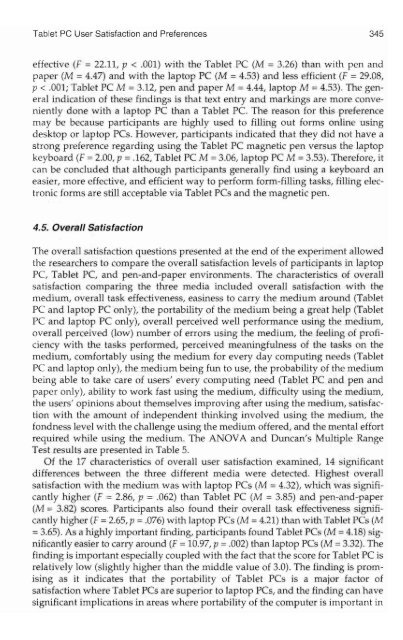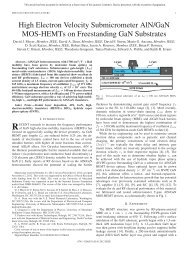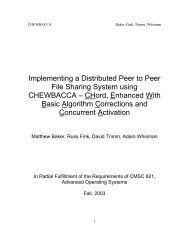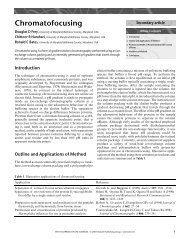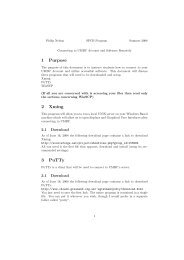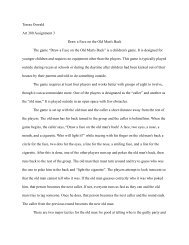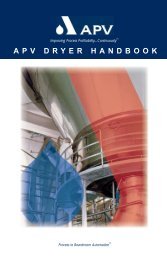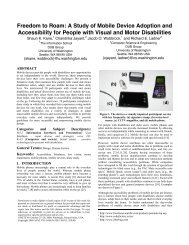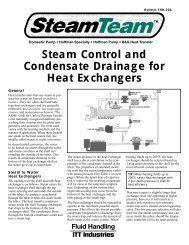A Comparative Study Between Tablet and Laptop PCs: User ... - Umbc
A Comparative Study Between Tablet and Laptop PCs: User ... - Umbc
A Comparative Study Between Tablet and Laptop PCs: User ... - Umbc
Create successful ePaper yourself
Turn your PDF publications into a flip-book with our unique Google optimized e-Paper software.
<strong>Tablet</strong> PC <strong>User</strong> Satisfaction <strong>and</strong> Preferences<br />
345<br />
effective (F = 22.11, P < .001) with the <strong>Tablet</strong> PC (M = 3.26) than with pen <strong>and</strong><br />
paper (M = 4.47) <strong>and</strong> with the laptop PC (M = 453) <strong>and</strong> less efficient (F = 29.08,<br />
P < .001; <strong>Tablet</strong> PC M = 3.12, pen <strong>and</strong> paper M = 4.44, laptop M = 4.53). The general<br />
indication of these findings is that text entry <strong>and</strong> markings are more conveniently<br />
done with a laptop PC than a <strong>Tablet</strong> Pc. The reason for this preference<br />
may be because participants are highly used to filling out forms onlin using<br />
desktop or laptop <strong>PCs</strong>. However, participants indicated that they did not have a<br />
strong preference regarding using the <strong>Tablet</strong> PC magnetic pen versus the laptop<br />
keyboard (F = 2.00, P = .162, <strong>Tablet</strong> PC M = 3.06, laptop PC M = 3.53). Therefore, it<br />
can be concluded that although participants generally find using a keyboard an<br />
easier, more effective, <strong>and</strong> efficient way to perform form-filling tasks, filling electronic<br />
forms are still acceptable via <strong>Tablet</strong> pes <strong>and</strong> the magnetic pen.<br />
4.5. Overall Satisfaction<br />
The overall satisfaction questions presented at the end of the experiment allowed<br />
the researchers to compare the overall satisfaction levels of participants in laptop<br />
PC <strong>Tablet</strong> PC <strong>and</strong> pen-<strong>and</strong>-paper environments. The characteristics of overall<br />
satisfaction comparing the three media included overall satisfaction with the<br />
medium, overall task effectiveness, easiness to carry the medium around (<strong>Tablet</strong><br />
PC <strong>and</strong> laptop PC only), the portability of the medium being a great help (<strong>Tablet</strong><br />
PC <strong>and</strong> laptop PC only), overall perceived well performance using the medium,<br />
overall perceived (low) number of errors using the medium, the feeling of proficiency<br />
with the tasks performed, perceived meaningfulness of the tasks on the<br />
medium, comfortably using the medium for every day computing needs (<strong>Tablet</strong><br />
PC <strong>and</strong> laptop only), the medium being fun to use, the probability of the medium<br />
being able to take care of users' every computing need (<strong>Tablet</strong> PC <strong>and</strong> pen <strong>and</strong><br />
paper only), ability to work fast using the medium, difficulty using the medium,<br />
the users' opinions about themselves improving after using the medium, satisfaction<br />
with the amount of independent thinking involved using the medium, the<br />
fondness level with the challenge using the medium offered, <strong>and</strong> the mental effort<br />
required while using the medium. The ANOVA <strong>and</strong> Duncan's Multiple Range<br />
Test results are presented in Table 5.<br />
Of the 17 characteristics of overall user satisfaction examined, 14 significant<br />
differences between the three different media were detected. Highest overall<br />
satisfaction with the medium was with laptop <strong>PCs</strong> (M = 4.32), which was significantly<br />
higher (F = 2.86, P = .062) than <strong>Tablet</strong> PC (M = 3.85) <strong>and</strong> pen-<strong>and</strong>-paper<br />
(M = 3.82) scores. Participants also found their overall task effectiveness significantly<br />
higher (F = 2.65, P = .076) with laptop <strong>PCs</strong> (M = 4.21) than with <strong>Tablet</strong> <strong>PCs</strong> (M<br />
=3.65). As a highly important finding, participants found <strong>Tablet</strong> <strong>PCs</strong> (M =4.18) significantly<br />
easier to carry around (F = 10.97, P= .002) than laptop <strong>PCs</strong> (M = 3.32). The<br />
finding is important especially coupled with the fact that the score for <strong>Tablet</strong> PC is<br />
relative}y low (slightly higher than the middle value of 3.0). The finding is promising<br />
as it indicates that the portability of <strong>Tablet</strong> <strong>PCs</strong> is a major factor of<br />
satisfaction where <strong>Tablet</strong> <strong>PCs</strong> are superior to [aptop <strong>PCs</strong>, <strong>and</strong> the finding can have<br />
significant implications in areas where portability of the computer is important in


